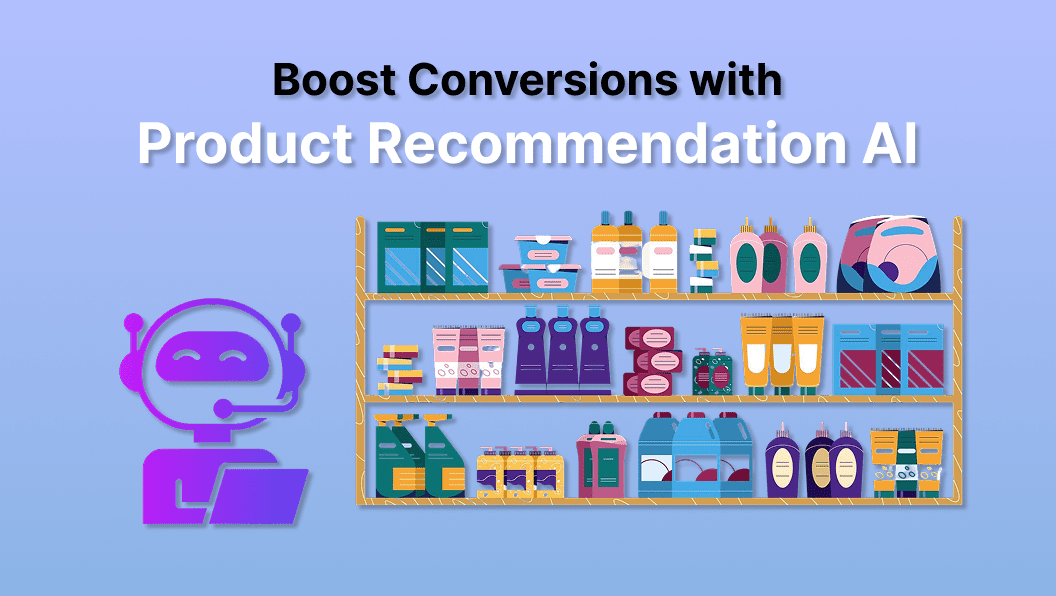Customer support automation allows businesses to automate up to 80% of the repetitive queries and redundant tasks, which is excellent for scaling without affecting customer experience.
To ensure instant replies, quick resolution, personalized responses, no wait times, 24/7 availability, and consistent performance without breaking the bank, customer support automation is the need of the hour for every business.
Let’s uncover what customer support automation means and how it works. We’ll explore what it can do and when businesses should adopt it. We’ve also picked some of the best customer support automation platforms to give you an idea of their features and capabilities, and also make your selection easier.
Part 1: What is Customer Support Automation?
Businesses need to offer support to their customers to answer their queries, solve their issues, build trust, collect feedback, increase sales, share information, etc. For this, they hire customer support representatives or human agents.
If all of this is automated using Natural Language Processing (NLP), Machine Learning (ML), and other automation and advanced technologies, there will be minimal human intervention needed. And this is what we call Customer Support Automation.
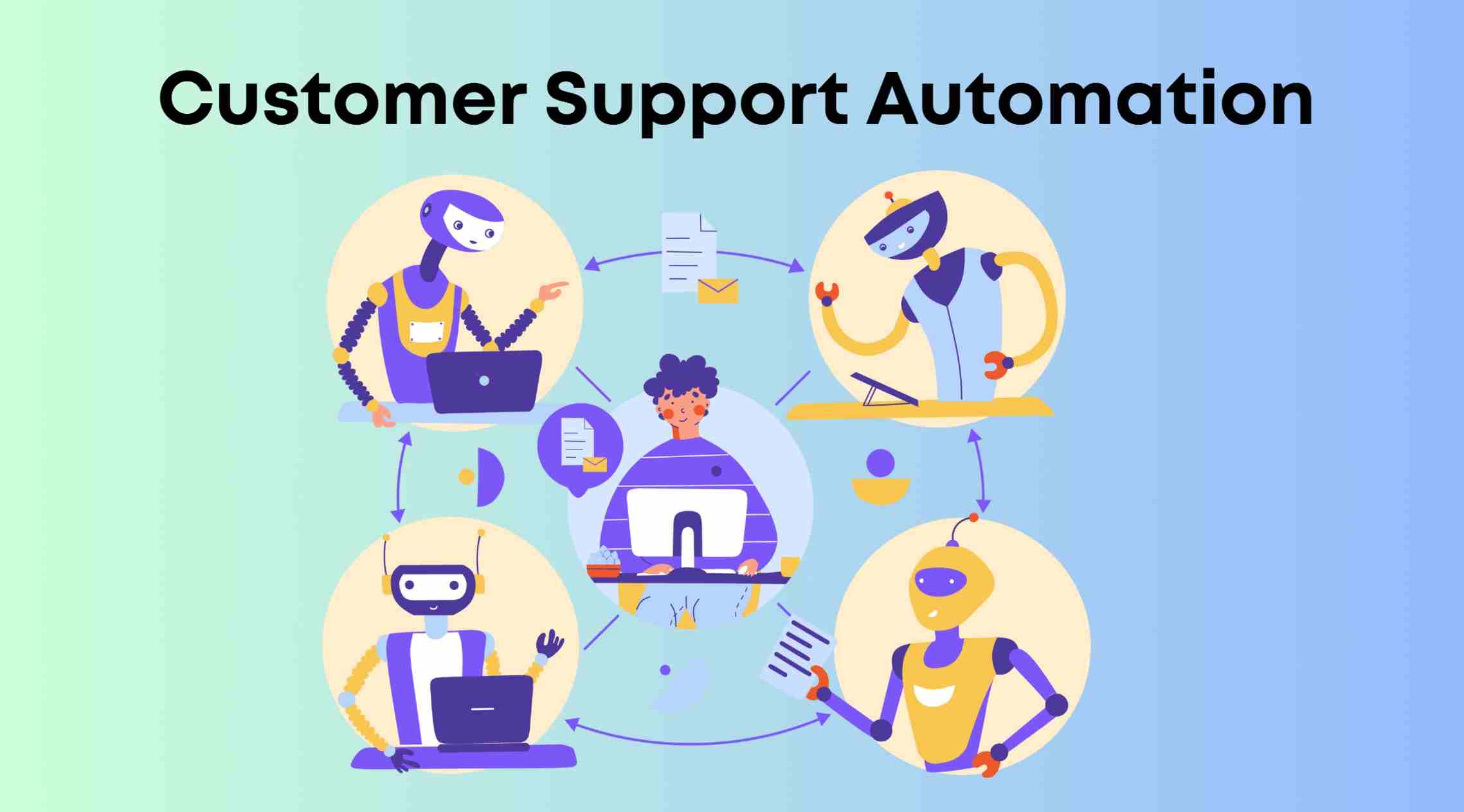
The AI chatbot or automated service will handle the customer queries and engage with them to solve their issues. It will be available 24/7, offer instant responses, and reduce the labor costs of companies. Most importantly, it improves the overall customer experience.
Most customer support queries and tickets are handled by the customer service automation. Only the queries that are extremely complex and require human intervention will be escalated to a human agent. Thus, around 70% of the job or more is handled by the automated service to reduce the burden on human representatives.
Part 2: How Does Automated Customer Service Work?
When a customer raises a query or interacts with the customer service, the chatbot or virtual agent understands the language through NLP. It translates the human language and figures out the intent behind the query.
It starts checking out the information available in its database. It follows the pre-defined workflows set by the user. Once it finds the relevant information, it provides a tailored response to the customer according to the query.
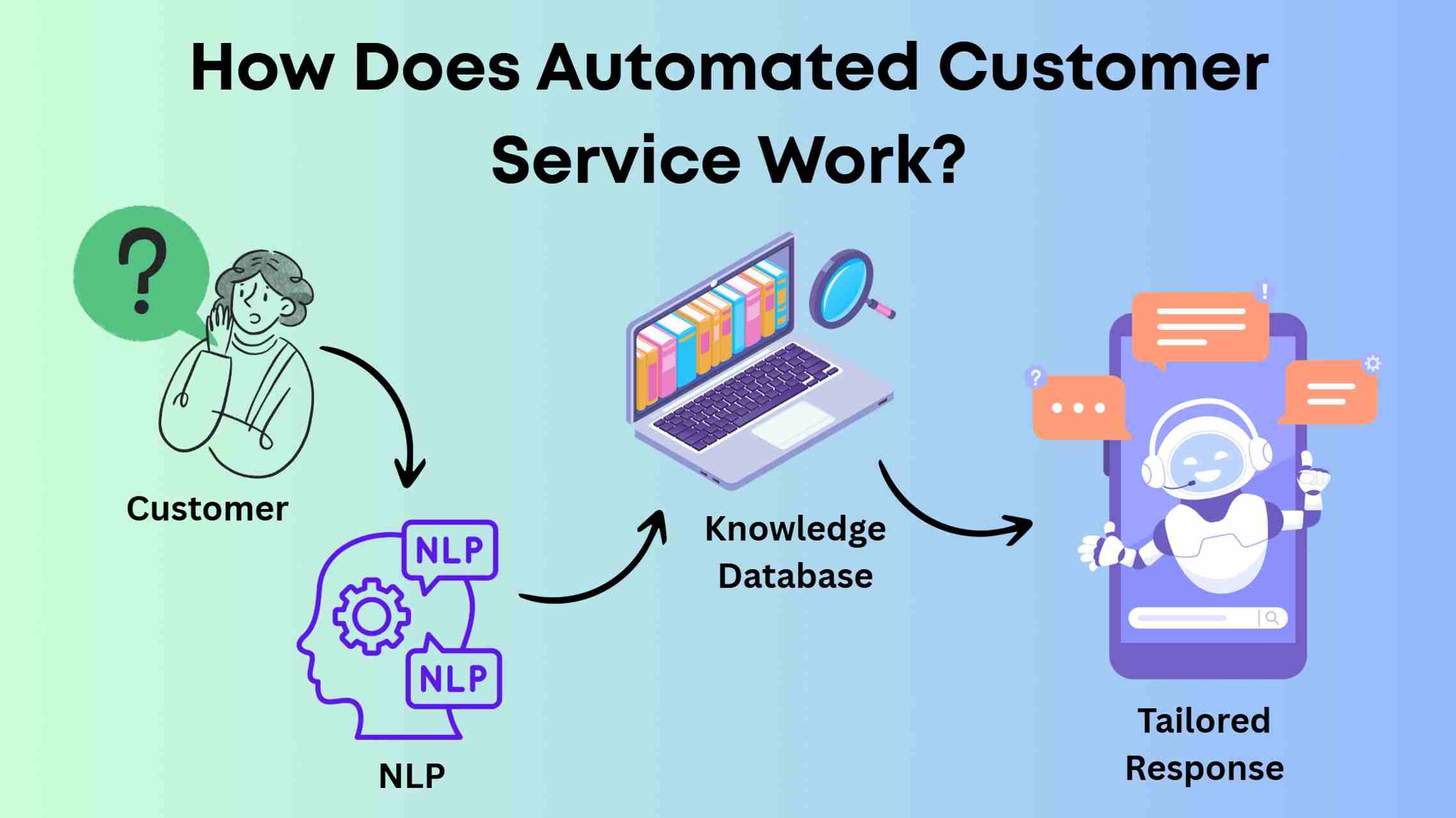
The automated tool is trained on massive data to handle customer issues and constantly learns from the experiences. That’s why it improves over time with Machine Learning and offers better results.
If the issue is too sensitive or complex to handle, it seamlessly hands over to the relevant customer support agent. The agent gets the AI analysis, summary, and every detail of the customer to take it forward and resolve the issue.
Part 3: When Do Companies Need Customer Support Automation?
Here are a few instances when companies need to opt for customer support automation.
- High Volume Queries: If companies are getting a high volume of redundant queries, they can automate them. It will save human agents from repetitive answers and allow them to focus on things that matter the most. This way, most of the low-complexity queries will be handled by the automation bot on its own.
- Slow Response Time: When the volume of support requests is high, customers need to wait in queues. It not only ruins the customer experience but also puts a burden on human representatives. Customer support automation can offer instant responses and reduce the wait time.
- Minimize Operation Costs: The cost of having human agents for customer support is significant. It can be reduced by handling most of the queries through automation. Thus, there will be fewer human representatives needed, which automatically reduces the operational expenses.
- Scaling: When companies need to scale or offer 24/7 global customer support, they need to go with customer support automation. It is the only cost-effective solution to handle customer requests without ruining their experience and going into losses.
Part 4: Customer Service Automation Examples
1 Chatbot and VAs
Chatbots and Virtual Assistants (VAs) are now extremely common. They are equipped with NLP and machine learning algorithms. They can understand the customer queries and send a tailored response.
Customers can engage with the chatbot and share their issues. It answers their questions and offers the solution. If there is anything complex, it seamlessly hands off the chat to a customer service agent.
2 Self-Service Automation
Self-service automation allows customers to find the solution to their problems on their own. Customers can enter the keyword or question, and it checks its knowledge base and pulls up a relevant blog post, FAQ section, guides, etc. Similarly, there are automated portals for checking order status, resetting passwords, updating customer profile information, etc.
3 Ticketing Automation
When customers interact with the chatbot or VA, they don’t have any idea which department is going to handle their request. That’s where ticketing automation comes into play. It understands the customer queries and creates a ticket for the relevant department and the most qualified person who can solve the issue.
4 Workflow Automation
Businesses also use customer service automation to automate their workflows. Suppose a ticket is created for a customer. It’s possible to create a workflow that will automatically send a confirmation email to the customer.
Similarly, businesses can automate appointment booking, rescheduling, and other tasks through automated workflows.
Part 5: Top 6 Customer Support Automation Tools in 2025
1 GPTBots
Best for ✅: Enterprises dealing with global customers and high-volume queries
GPTBots helps enterprises create AI agents for customer service, enterprise data search, leads, data insights, etc.
It allows businesses to handle 90% of the issues seamlessly using advanced AI. The AI customer is highly efficient and designed to boost customer experience and reduce operational costs by 70%.

🔨 Key Features:
- Supports over 90+ languages, which is ideal to target global clients
- Offers seamless training of AI agents by supporting all file formats and URLs. Makes updating anything a breeze
- Provides complete data insights, such as the resolution rate, issue categorization, human takeover rate, and CSAT
- Allows users to design any kind of workflow without coding. The visual builder is like a drag-and-drop tool for making complex workflows
- Supports multiple LLMs to ensure the best response customization for the business
👍 Pros
-
Incredible accuracy of answers and ensures tailored responses
-
Offers 24/7 support at an affordable pricing
-
Interacts like a human agent, adapts to the tone, style, and brand voice
-
Instant integration with your existing platforms like WhatsApp, Slack, Telegram, etc.
-
Anyone can build customer support automation with GPTBots; no expertise needed
👎 Cons
-
Only suitable for large enterprises; could be expensive for small businesses
2 Tidio
Best for ✅: Small and medium businesses that want to automate customer service
Tidio offers an AI customer service chatbot, Lyro AI, to enhance resolution rates and customer experience. It can reduce 67% of your repetitive queries through AI chat. It’s perfect for small and medium businesses and ensures human-like responses and brand voice alignment.
It’s capable of handling high-volume queries with incredible accuracy and efficiency. It can automate complex workflows and support tasks at minimal cost. It’s an all-in-one solution that not only improves customer experience but also relieves human agents.
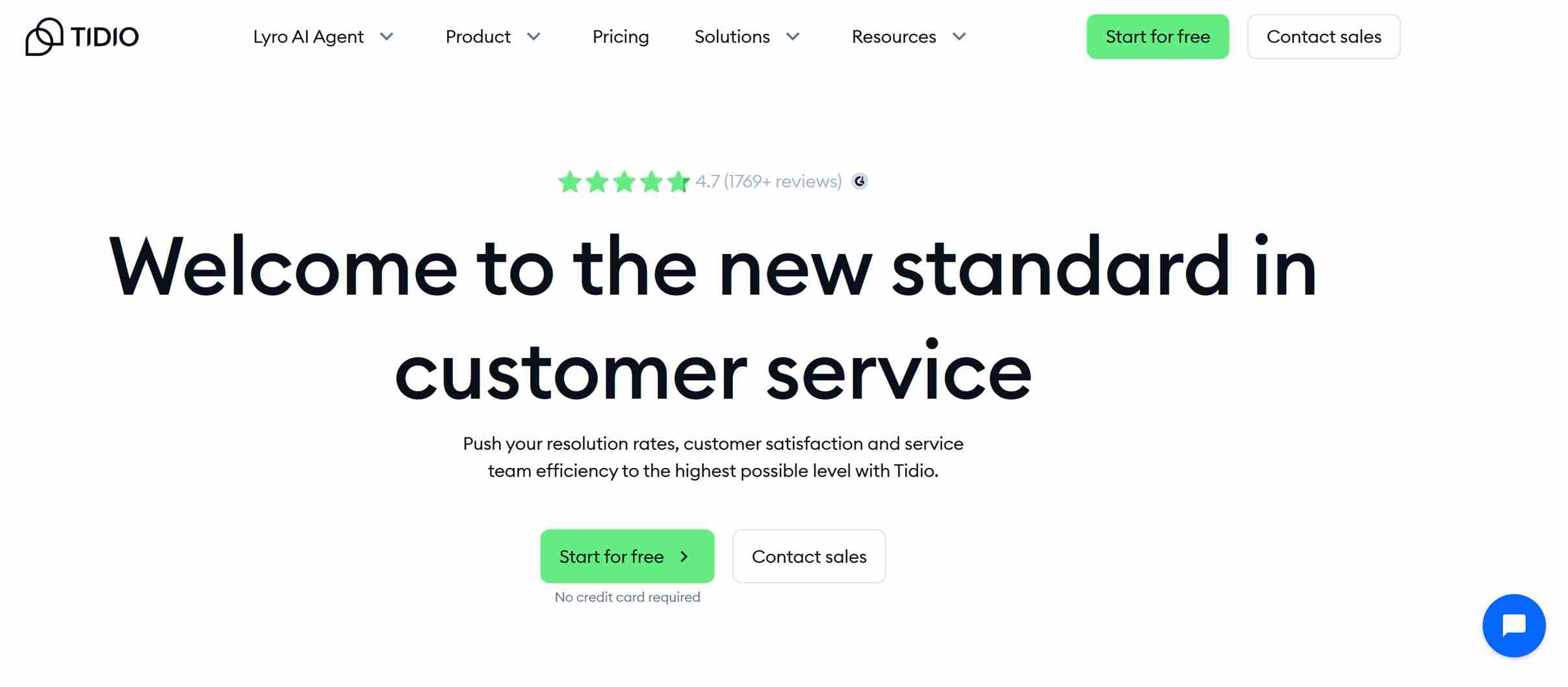
🔨 Key Features:
- Supports 13 languages to cover a wider audience; more languages will be added over time
- Streamlines the whole customer support process. Handles most of the queries and ensures seamless hand-offs to live agents
- Lyro agent handles complex questions and queries with great accuracy
- Makes your customer service team streamline with Lyro AI, Help Desk, Live Chat, and Flows
👍 Pros
-
Offers a 50% resolution rate guarantee; otherwise, you can take your money back
-
Linking Lyro AI to your business tools is pretty simple
-
50 free conversations to try the performance
-
Unlimited replies in any conversations without any extra cost; takes money per conversation
👎 Cons
-
It could be expensive if you have multiple users
-
Limited customization options
3 Zendesk
Best for ✅: Large enterprises and teams looking for a scalable yet affordable solution
Zendesk offers a complete customer service automation solution. From customer to employee conversations, it streamlines everything in one place. The AI agents automate 80% of your interactions on different channels.
It reduces the effort required for every ticket or query while making the lives of agents easier and improving customer experience. If you are thinking about scaling at a faster rate, it could be an excellent choice to handle high-volume queries.
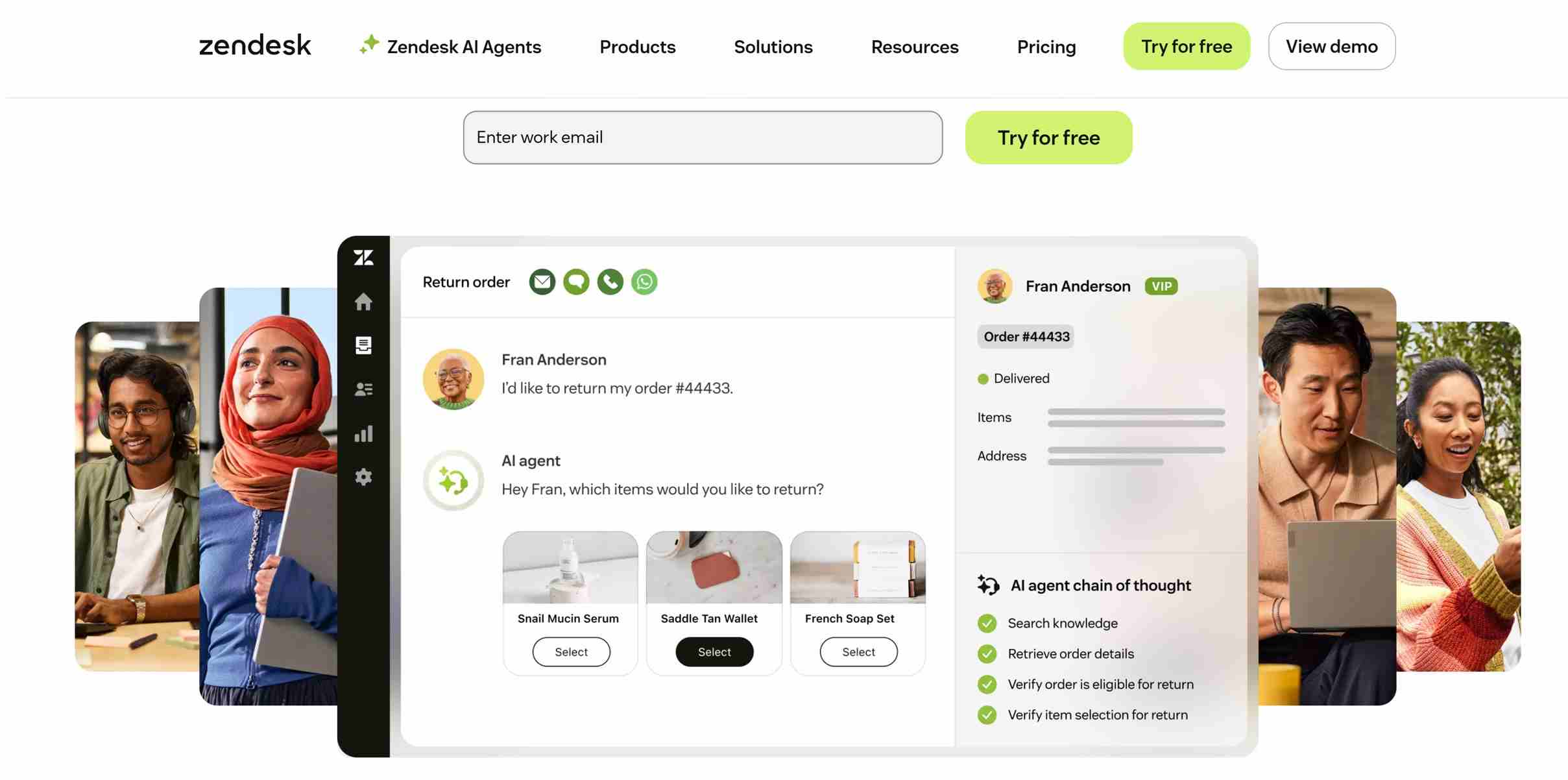
🔨 Key Features:
- A complete solution offering AI agents, ticketing, live chat, voice, analytics, help center, routing, agent workspace, etc. Empowers customer service with robust solutions
- Powered with Agentic AI that allows the AI agents to find reasons, make decisions, and ensure better resolution, unlike scripted AI agents
- Supports more than 30 languages and ensures a personalized response to every customer in native fluency
- Offers detailed insights by collecting important data points. Businesses can easily improve the customer service and agents’ individual performances
👍 Pros
-
Uses proprietary AI models that are meant for customer service, which ensures excellent results.
-
Can be used across all channels, including web, email, voice, social media, etc.
-
Automates most redundant and repetitive tasks and saves time
-
Affordable pricing plans compared to many customer service automation platforms
-
Offers a free testing option
👎 Cons
-
Requires time to learn and improve its performance
-
The AI is quite basic
-
Limitations in exporting data
4 Freshdesk
Best for ✅: Businesses looking for an omnichannel support platform and comprehensive solutions
Freshdesk brings AI agents and human agents to one platform to make customer support more effective and mostly automated. Its Freddy AI offers instant answers to customer queries and assists customer service agents in increasing efficiency and effectiveness.
Its average conversational resolution time is less than 2 minutes, which is incredible. It can reduce the response time by 83% and improve the agent productivity with Freddy AI Copilot.
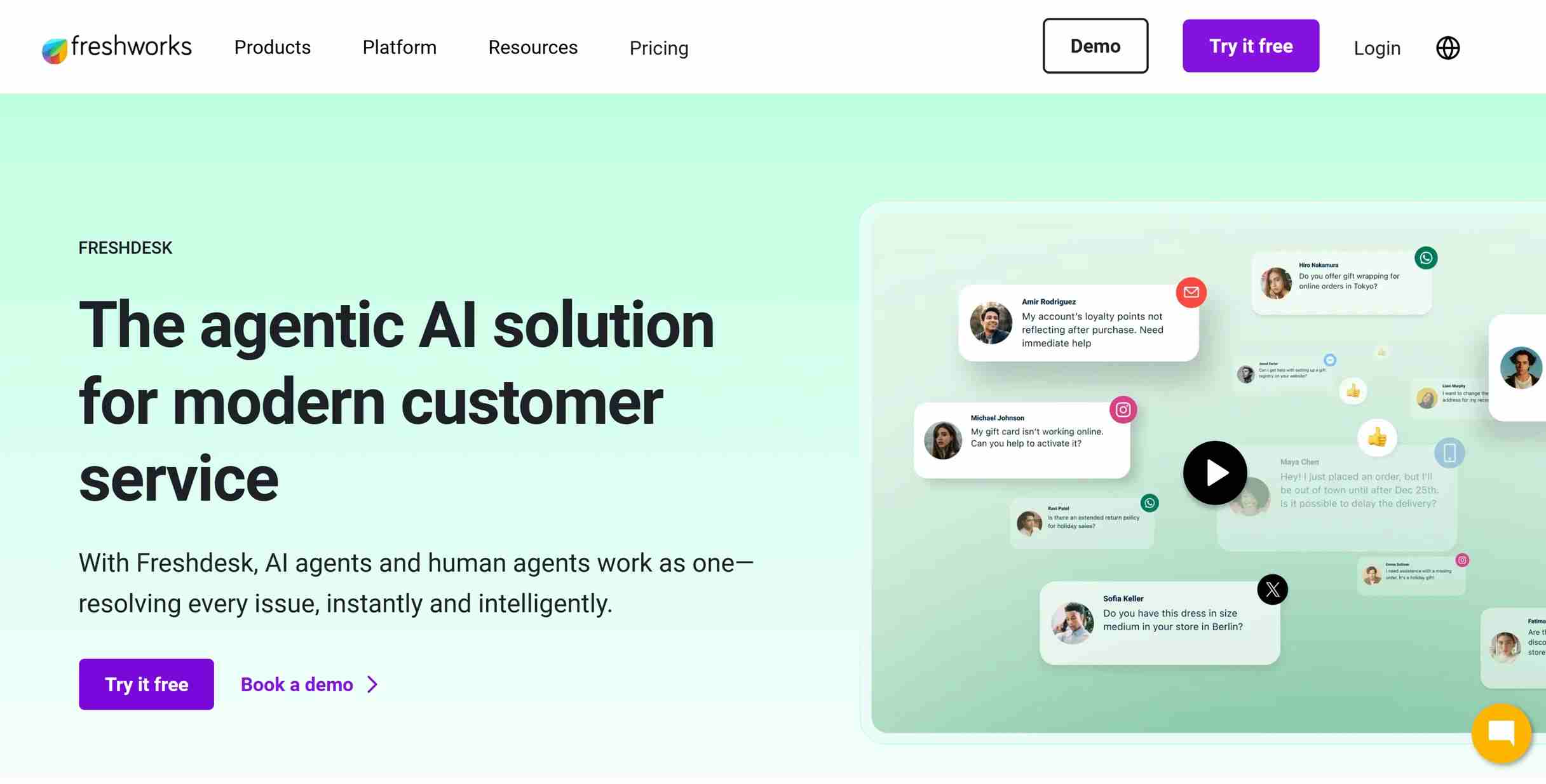
🔨 Key Features:
- An omnichannel automated customer support platform with powerful AI agents and copilots to assist human agents
- Offers a comprehensive solution through chat, self-service, unified context, advanced workflow, and detailed analytics
- Automatically resolves most of the issues with conversational AI. They can update records, process requests, handle email tickets, etc.
- Its AI Copilot empowers your team with summaries, live translation, and suggestions, which saves a lot of time and makes their lives easier
👍 Pros
-
Works all your business apps like Shopify, WhatsApp, Messenger, Teams, Slack, etc.
-
Incredible ticketing system for teams to create, assign, and track issues for faster resolution
-
Handles every customer support aspect, including ticketing, self-service, and live chat
-
Extremely easy to use and has a user-friendly interface to get started without hassle
-
Affordable pricing and a free plan are also available
👎 Cons
-
Reporting and analytics are limited in low tiers
-
The cost of add-on and advanced features is high
5 Intercom
Best for ✅: Customer support teams looking for an all-in-one solution and a dedicated AI engine
Intercom is a reputable name in AI customer service. It has introduced an incredible AI customer service agent. It’s extremely powerful, as it can resolve complex issues without human intervention. It also offers a customer service suite, which includes its AI agent “Fin” and a dedicated helpdesk for customer support representatives.
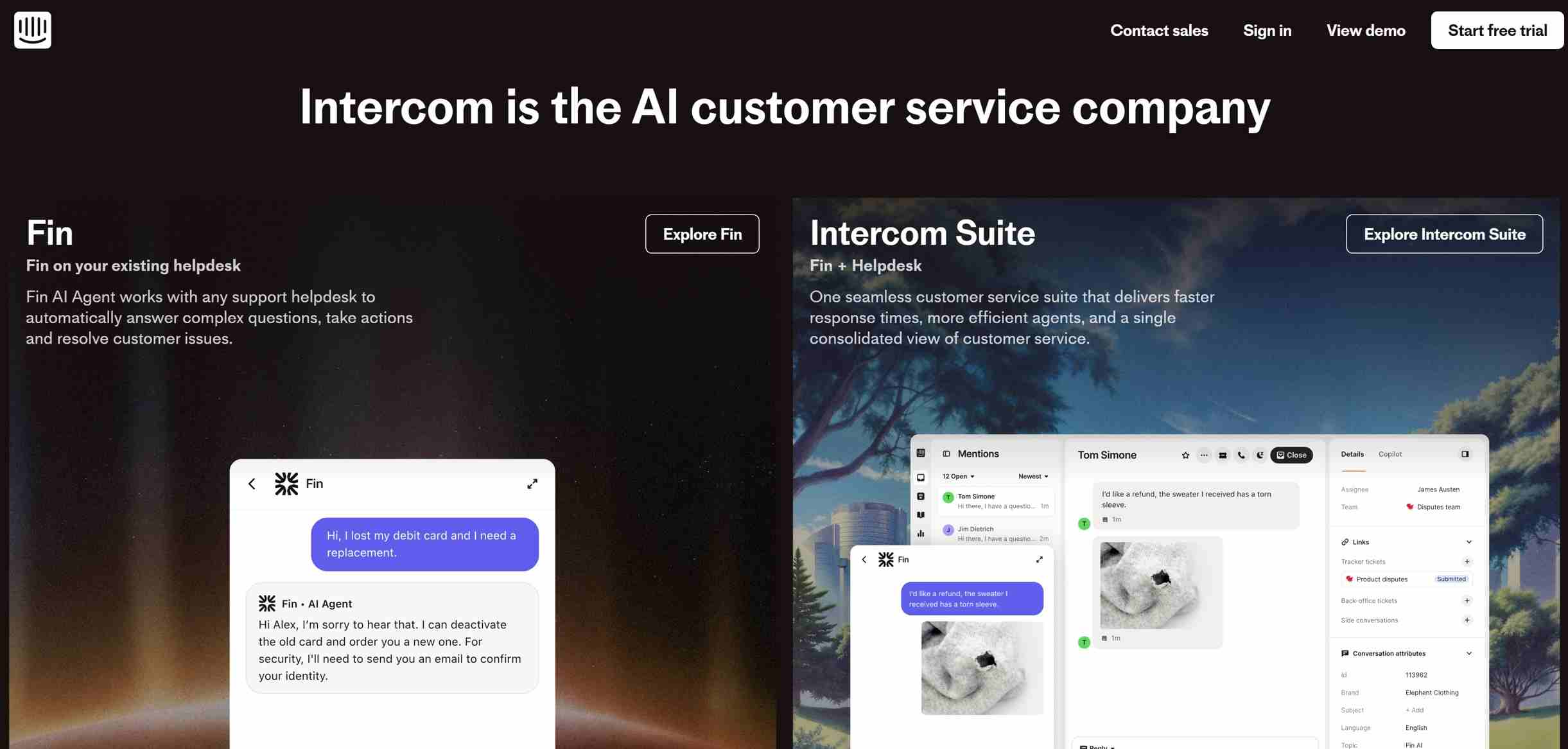
🔨 Key Features:
- Fin is highly customizable, and businesses can customize it according to their needs without any coding
- You can train Fin AI to be equipped with the brand’s tone of voice, company knowledge, policies, etc.
- The reporting is exceptionally detailed, which allows businesses to spot trends, fill content gaps, and solve existing issues.
- Uses its own patented AI engine that is specially engineered for customer support, which ensures incredible performance.
👍 Pros
-
Answers in more than 45 languages
-
Works with almost any help desk and integrates seamlessly
-
Unmatchable accuracy and speed
-
Improves resolution rate over time as it learns
👎 Cons
-
Could be very complex for users
-
Very high pricing
-
You need to switch your complete customer support to Intercom for better results
6 Zoho Desk
Best for ✅: Businesses looking for an affordable customer support automation
Zoho offers a wide range of SaaS solutions for businesses. Zoho Desk is also a popular yet affordable help desk software to solve customer issues, reduce the workload on human agents, and enhance customer experience.
Zia Agent is the AI customer support specialist available for customers 24/7. With excellent speed and accuracy, it handles most of the redundant queries.
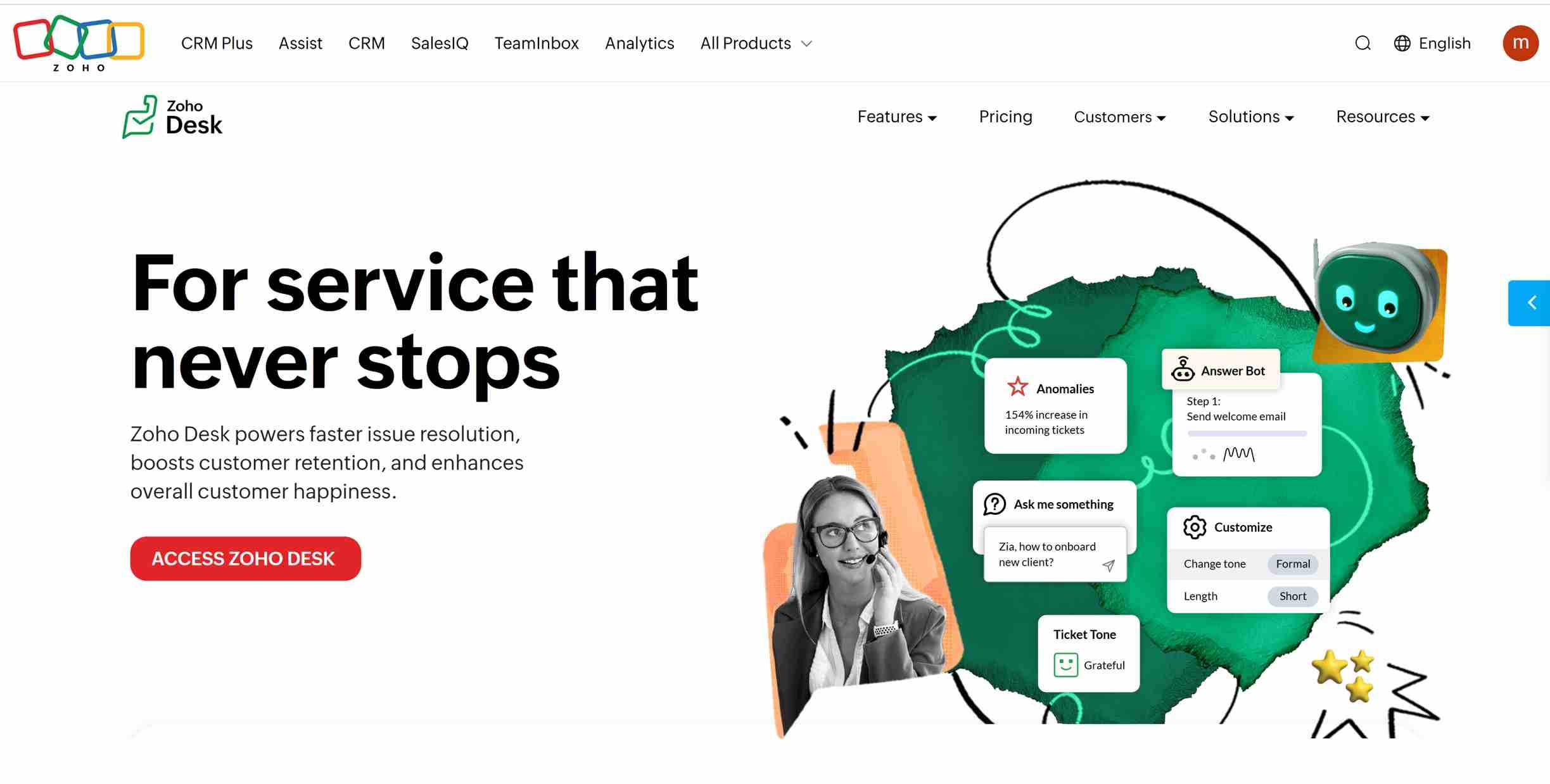
🔨 Key Features:
- Handles multiple channels, including email, SMS, social media, live chat, and forms, at the same time, and offers instant responses
- An all-in-one solution for chatbot, self-service, and workflow automation
- Offers pre-built AI agents for different purposes like customer support, issue resolution, quality management, etc. Users can even create their own AI agent from scratch
- Makes the lives of human agents simpler by providing context, creating responses, refining answers, etc.
👍 Pros
-
Zia analyzes the feelings in each conversation for a better resolution
-
Excellent customization options, including layouts, branding, templates, etc.
-
Offers reports to assess the performance of the agent via a live dashboard and mobile app
-
Seamless integration with 200+ third-party apps and 50+ native apps
👎 Cons
-
A simple tool that lacks advanced features for customer support automation
-
Not a very advanced AI like others
Conclusion
With customer support automation, businesses can serve their customers with pride. They can assist them with quicker resolutions, 24/7 availability, excellent customer experience, and a lot more. Almost all types of businesses, from small to large enterprises, can adopt customer support automation to automate their redundant and repetitive tasks and allow customer service agents to focus on more important queries. It allows businesses to serve a massive audience while reducing operational costs.





